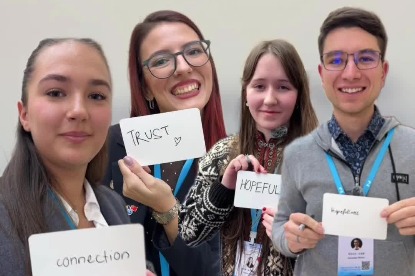Education on legal matters strengthened
Courses customized for young people and elderly to make laws more relatable

Editor's note: This year marks the fifth anniversary of the introduction of Xi Jinping Thought on the Rule of Law. This story is the third in a series exploring its implementation across the country.

On a wet October afternoon in Beijing, a group of teenage students gathered around a mediation table to discuss a potential court case. Some scrutinized "evidence bags" and debated "property allocation", while others consulted the Civil Code to confirm the validity of "wills".
This was not an actual trial but an immersive legal workshop where students took on the roles of plaintiffs, defendants and judges to navigate an inheritance dispute.
The session, centered on wills and property division, was part of an innovative initiative by Haidian District People's Court to make the law more relatable and accessible to young people.
Under the guidance of Sun Jiayun, who assists judges in case handling at the court, the students from Beijing 101 High School completed the workshop within an hour, learning not only about the legal validity of wills, but also judicial procedures such as court investigation, evidence exchange and statements.
Legal education in China is undergoing a transformation, and it now offers customized courses for different participants, according to Sun.
This transformation is a result of the implementation of Xi Jinping Thought on the Rule of Law, which emphasizes the need to focus on the effectiveness of legal education, particularly by strengthening law education for young people.
On Monday and Tuesday, at a central conference on work related to overall law-based governance in Beijing, President Xi Jinping instructed that efforts should be intensified on advancing the rule of law across various sectors in the nation's modernization drive.
Xi, who is also general secretary of the Communist Party of China Central Committee and chairman of the Central Military Commission, called for across-the-board efforts to ensure society-wide observance of the law.
Zhao Leji, chairman of the National People's Congress Standing Committee, also underscored the priority of law-based governance, stressing the need to deepen the endeavor to build a law-abiding society.
The meeting coincided with the fifth anniversary of the introduction of Xi Jinping Thought on the Rule of Law, which requires upholding a people-centered approach in advancing the building of the rule of law, and continuously enhancing the legal awareness and literacy of the entire public.
Sparking interest
Han Chu, a sophomore from the high school, played the role of a "judge" that afternoon.
During the workshop, he listened carefully to the statements of classmates playing the plaintiff and defendant, verified the various items of evidence they provided, and frequently consulted the provisions related to wills in the Civil Code.
The script, adapted from real cases, revolved around three siblings who brought their deceased parents' handwritten, printed and audio-recorded wills to court, with each claiming sole inheritance.
Han, guided by Sun, concluded that all three wills had legal flaws in accordance with the code, ruling that the family's assets should be divided equally among the three children.
"Not only was this activity incredibly interesting, but it truly helped me grasp legal concepts. I've gained a much deeper understanding of the law by taking part in the workshop," Han said.
His classmate Hu Shihan said: "The activity felt much more real than just reading textbooks. By stepping into a character's shoes, I experienced the courtroom process firsthand, which let me understand what I learned in class."
Sun beamed with satisfaction at the students' engagement. "For young people, such an immersive method is key to providing legal education," she said. "Reading law books and observing trials used to feel distant. By becoming the judges and litigants involved, their engagement and understanding deepen."
"Our primary goal was never just to teach them laws, but to ignite a genuine interest. After all, interest is the best teacher, and that's the most important foundation for any learning," Sun added.





































